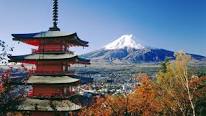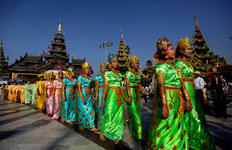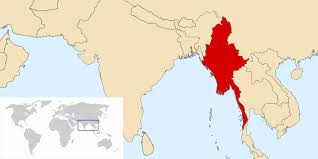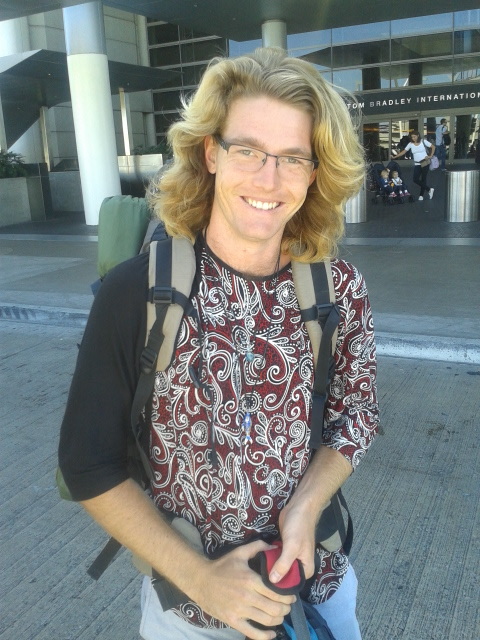|
It's crazy to think that I'm entering the final stretch of my time in Thailand. After several months of adventure and exploration, there are only 4 and a half weeks left of school. There's one big journey between me and finals: a trip to Myanmar, formerly known as Burma. I'm very excited for this journey, and history should be a big part of the experience.
Myanmar's two names speak to the nation's diverse heritage: over 100 different peoples live in the country. The largest group, the Bamar, gives the country one of its names. Myanmar has been populated for thousands of years, and a number of empires called the region home. The Burmese were once a dangerous force in Southeast Asia, and they destroyed one of Thailand's great kingdoms, Ayutthaya, several hundred years ago. In 1824, the British conquered and colonized the region. For the next 120 years, they ruled over Myanmar, despite the sometimes violent protests of local people. In 1948, after the horrors of World War II, Burma gained its independence. However, less than fifteen years later, the Burmese military staged a coup. For the next fifty years, democracy was virtually dead in Burma: generals ruled over all aspects of the society, and the country became one of the poorest in the world. In 1990, after years of protest and thousands of civilian deaths, the country held its first election. The National League for Democracy, lead by Nobel-Prize winning Aung San Suu Kyi, won 80% of the seats in Parliament. However, the military refused to turn power over, and ruled until 2011. In the last five years, the government has changed slightly, opening up space for more democratic processes. Yet, the generals have also developed a plan for 'disciplined democracy,' one that guarantees the military 25% of the seats in parliament, no matter what happens. This week, the country held elections and, once again, Aung San Suu Kyi's government won a large majority of seats. Time will tell how these events affect Myanmar's society. In the meantime, foreigners have been allowed to visit the country for the first time ever. I'm interested in seeing what this almost untouched land is like.
1 Comment
 I just returned from an amazing adventure: a week spent in Japan. My journey took me to the capital, Tokyo, where I spent three days visiting temples, parks, and interesting parts of the city. Japan is a very modern nation, with highly planned and regimented cities that offer a sense of peace and order not found in Western metropolises. In addition to Tokyo, I traveled to Kyoto, the nation's ancient capital, and explored the region, camping by a small town near a great lake. On the final day, I woke up with the sun and hitch hiked back to Tokyo. The Japanese people I met along the way were extremely friendly and accommodating, and I think that I could spend some years living there. While Japan's present is interesting, the country's history is almost incredible. While the islands that make up Japan have been settled for tens of thousands of years, they have remained relatively isolated for much of this time. For example, during the reign of the Tokugawa shogunate, a rule that lasted for over 260 years, foreigners were only allowed to trade with Japan in one port, and very few received imperial support. However, that all changed in 1853, when an American commodore named Matthew Perry sailed to Japan with heavily armed ships. He ignored the emperor's requests and demanded that Japan open up a trading relationship with America. This event was met with alarm throughout Japan. Many Japanese people at the time believed that the emperor was a god, so it was almost unbelievable that a man like Perry might ignore the emperor. Within the span of fifty years, Japan became a highly advanced modern nation, one that had a complex system of railroads and telegraphs, highly respected medical and scientific institutions, and a powerful navy. Along with this quick rise to power, the Japanese developed a highly imperialistic form of nationalism, one that lead to aggression and war. During World War II, the Japanese sided with the Axis powers, and fought viciously until the atomic bomb destroyed Hiroshima and Nagasaki. Then, after the war, America restructured Japan again, this time finding a way to instill values of peace and productivity in the nation. Now, many of the world's cars and electronics come from Japanese companies. This roller-coaster ride would have been impossible for anyone to imagine just 150 years ago. Over the past 8 weeks, I've been contributing to an organization that aids refugees as an intern. I've learned a lot on the job, which also includes a writing position. I've been researching and writing about different human rights issues in South East Asia. Most recently, my focus as been on land grabbing, which is when large companies, some of them government-owned, take land away from local people to start planting crops that they can sell to people all over the world, like rubber, which people use for tires. It's interesting to see how the things that people in the West buy affect the poor all over the world.
Another interesting issue that I've encountered has been the struggle for independence in Southern Cameroon. Cameroon has a complex colonial history; it was, at different points, controlled by British, French, and German powers. Thus, different parts of the country speak different languages, and at the end of colonialism, no one was entirely sure how Cameroon would be organized. The process of independence began in the 1950s, and in 1959, Southern Cameroons effected the first democratic transfer of power in 20th century Africa. Eventually, the UN gave the people who live in Cameroon several options, including unification with Nigeria or joining the French and English speaking parts of the country together into Cameroon. When the country was formed, the government of Cameroon was a federal government, composed of two states – one, the French-speaking 'La Republique du Cameroun,' and the other, 'Southern Cameroons.' For the first several years, these two states coexisted on equal terms, and, while they still experienced problems, they had a functioning democracy. However, in 1972, the leader of La Republique du Cameroun announced a 'unitary government,' in which South Cameroons could not keep its own legal traditions. Since then, people in South Cameroons have reported many abuses on the part of government officials, and they have few opportunities to change their nation, as many political parties are outlawed. Members of the Southern Cameroons National Council are regularly arrested for holding meetings, and some have been tortured and killed. Today, Southern Cameroon holds a place on the Unrepresented Nations and Peoples Organisation. I've been visiting a political refugee from Cameroon for some time now – he went through some horrible things in his home country when he spoke out against oppression. Meeting with him has been fascinating and inspiring, and also sad – I still know very little about Cameroon, and there must be many other places like it in the world. |
Adam De GreeI am a senior in college, studying philosophy, and am visiting family in the Czech Republic and travelling and studying in Europe and Asia. Archives
January 2016
Categories
All
|
|
SUPPORT
|
RESOURCES
|
|




 RSS Feed
RSS Feed



